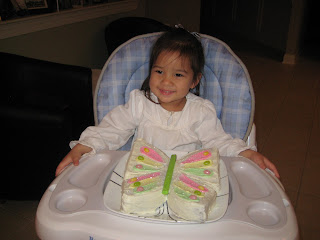Callie has childhood apraxia of speech (CAS), also known as developmental apraxia or verbal apraxia. Apraxia-kids.org has a good explanation:
What is Childhood Apraxia of Speech?
Childhood Apraxia of Speech is a motor speech disorder. For reasons not yet fully understood, children with apraxia of speech have great difficulty planning and producing the precise, highly refined and specific series of movements of the tongue, lips, jaw and palate that are necessary for intelligible speech. Apraxia of speech is sometimes called verbal apraxia, developmental apraxia of speech, or verbal dyspraxia. No matter what name is used, the most important concept is the root word "praxis." Praxis means planned movement. To some degree or another, a child with the diagnosis of apraxia of speech has difficulty programming and planning speech movements. Apraxia of speech is a specific speech disorder.
The act of speech begins with an intention to communicate. Next, an idea forms, outlining what the speaker wants to say. The words for the desired message are put in the correct order, using the correct grammar. Each of the words are comprised of a specific sequence of sounds (also called phonemes)and syllables that must be ordered together. All of this information is translated from an idea and information about order of sounds into a series of highly coordinated motor movements of the lips, tongue, jaw, and soft palate.
The brain must tell the muscles of these “articulators” the exact order and timing of movements so that the words in the message are properly articulated. Finally, the muscles must work properly with enough strength and muscle tone to perform the movements needed for speech.
In typically developing speech, children make word attempts and get feedback from others and from their own internal systems regarding how “well” the words they produced matched the ones that they wanted to produce. Children use this information the next time they attempt the words and essentially are able to “learn from experience.” Usually once syllables and words are spoken repeatedly, the speech motor act becomes automatic. Speech motor plans and programs are stored in the brain and can be accessed effortlessly when they are needed. Children with apraxia of speech have difficulty in this aspect of speech. It is believed that children with CAS may not be able to form or access speech motor plans and programs or that these plans and programs are faulty for some reason.
The day Callie was first diagnosed with PMG they told us she may never talk. When we went to see Dr. Dobyns in Seattle he told me she may have oral motor dyspraxia. I spent time in the beginning pouring over a blog and book all about about Schuyler, a young girl girl with PMG and no words. It should not come as a surprise that Callie is nonverbal so far, and has now been diagnosed as very apraxic. And yet hearing it from her speech language pathologist (SLP) last week was very difficult. We met for an hour to discuss Callie's slower than hoped progress with speech. We talked about how receptively and cognitively she is so much farther ahead of what she can express. We decided it was time to come up with an alternative game plan for helping Callie with communication before she gets frustrated. In the end we opted to enter the AAC world. AAC (augmentative and alternative communication) is a term that encompasses the communication methods used to supplement or replace speech for those with impairments in the production of spoken language. DynaVox is a leading provider of speech communication devices. Callie will be evaluated by a rep from DynaVox within the week. Her SLP thinks she will be a good candidate for a speech device, whether it be a DynaVox or an iPad with an app like Proloque2go. If we go this route, this will only be used as a supplemental tool while we continue to aim for vocalization.
I have to admit I have started to lose a little hope when it comes to Callie speaking now that we are 3 years in with such little progress, but while feeling down after the SLP meeting I reached out to my wonderful local special moms group and three moms were quick to offer encouragement through their own stories. One has a daughter with severe apraxia who was nonverbal until almost 6 years old. She also understands everything like Callie. She was given an AAC device in school and it ended up motivating her to talk. She is 9 years old now and talking in 3-4 word sentences. The second has a daughter with severe apraxia and only spoke five words at age 3. She is now 8 and after years of intensive speech therapy she is communicating well. The third explained her daughter spoke her first word at 3 1/2 and did not even babble before then. She is now 5 years old and is a chatterbox, communicating in full, accurate sentences. Such wonderful and amazing stories about these girls! All three encouraged me to hang in there and not lose hope. So I will not.











































